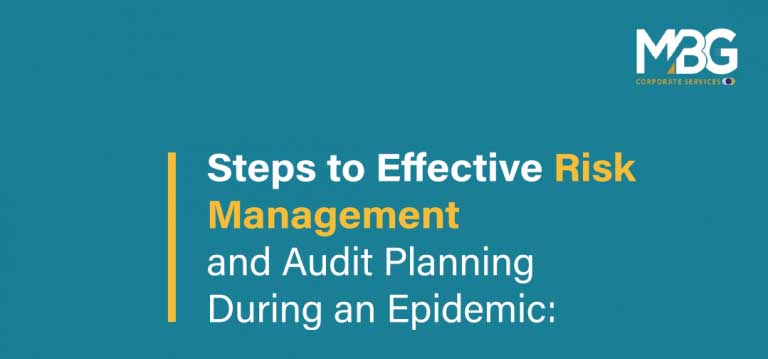How the Coronavirus may affect Financial Reporting and Auditing
April 16, 2020

The coronavirus pandemic has the potential to create significant changes for Accountants who prepare company financial statements — and for auditors as well.
In the face of disruptions to global supply chains and other business activity, the SEC and the PCAOB in mid-February issued limited guidance to public companies and auditors for how they should manage their response to the pandemic.
“We urge issuers to work with their audit committees and auditors to ensure that their financial reporting, auditing, and review processes are as robust as practicable in light of the circumstances in meeting the applicable requirements”.
Fieldwork could pose a particular problem for auditors. The regulators expressed concern that auditors may have difficulty gaining access to the evidence and people they need to support their audit opinion. The most immediate effect the regulators raised in the statement concerned the disclosures mandated by FASB Accounting Standards Codification (ASC) Topic 855, Subsequent Events.
For the time being, the Center for Audit Quality (CAQ), which is affiliated with the AICPA, is advising practitioners to monitor regulators’ statements closely and keep them in mind when planning audits and carrying out their audit and review procedures.
“In keeping with recommendations from the Securities and Exchange Commission, audit firms are working in close collaboration with public companies’ audit committees and management to help ensure financial reporting and auditing processes remain robust and as timely as possible amid the global coronavirus crisis,” the CAQ said in a statement. “Audit firms are committed to maintaining high standards of audit quality as they serve their audit clients during this crisis while supporting the health and safety of their employees. The audit profession will remain in close contact with regulators as the impact of the virus on companies, auditors, and the audit process continues to be assessed.”
Some in the accounting community say the March quarter’s financial statements will provide evidence of the outbreak’s financial effects. These experts recommend that finance personnel and practitioners take the following steps.
Accounting firms are already implementing contingency plans for how the epidemic may affect their audits. If you have a team of 10 people that are typically in the field for a particular client, you have to start thinking what if this all of a sudden spreads throughout an office or throughout a client, and you don’t have the people to do the work. That’s just within the firm — the resource constraints they might face in the planning process. The planning sessions are also going to have to weigh how the client has been affected, not just in terms of its business operations and key accounts, but whether its staff is available to meet with auditors and/or whether its offices and facilities have been padlocked. In addition, travel restrictions might prevent visiting the client.
Wall Street’s decline into a bear market and the severe disruption that is rapidly unfolding for many business activities are certain to have a profound effect on March quarter results at many companies. The companies that believe their operations are being hurt may have to seriously consider making asset impairments and including detailed disclosures in the notes to their financial statements about their reduced revenue and earnings forecasts. The SEC and PCAOB’s February statement reminded public companies and their auditors “to consider potential disclosure of subsequent events in the notes to the financial statements” for year-end 2019 financial statements. Because the financial fallout is likely to worsen for March quarter financial statements, companies can be expected to continue making footnote disclosures about the pandemic’s effects during upcoming reporting periods.
Accounting estimates have long been among the more complex tasks for auditors. Because of the extensive and unpredictable nature of the coronavirus epidemic, auditors can expect that their assessments of clients’ accounting estimates will be even more complicated than usual in upcoming reporting periods. Auditors have been quick to recognize that many significant accounts, including sales, inventory, and bad debt expenses, will be affected, as will normal business activities such as production and distribution. Face-to-face meetings with clients remain an essential part of the audit process. Potential travel restrictions caused by the pandemic could make those in-person meetings difficult. It may mean some modifications to normal audit procedures.
Employee illnesses and office closures may lead to the breakdown of internal controls. Management may need to implement alternative controls if the controls that are in place are not effective.
Clients that were financially healthy entering 2020 may have found themselves with cash shortfalls by February. That’s going to affect how auditors examine their financial information, particularly with outstanding loans and debt covenants from lenders.
With so much business activity squeezed and substantial doubt about when business will resume something of a normal pattern, companies that had problems may face a struggle to survive.
The Accounting support and Audit team in MBG Corporate Services is committed to providing exceptional service quality which goes far beyond regulatory demands for greater disclosure and aims to increase transparency and build confidence. Our audit complies with the International Financial Reporting Standards (IFRS). We follow globally proven risk-based audit methodology providing a timely service and no last-minute surprises. We adapt our audit services to fit the client’s unique requirements, understanding we have a responsibility to continue our work in building trust in corporate reporting. The quality of our Audit is maintained by qualified professionals who have a breadth of experience and to whom we provide the best available ongoing personal and professional development.

Taher Singaporewala,
Designation: Associate Director - External Audit
About Author:Areas of Specialization:
- External / Statutory Audits
- Review and analysis of financial statements
- Advisory on International Auditing Standards (IASs), International Financial Reporting Standards (IFRS) and the UAE Commercial Law
- In-Country Value (ICV) certification
- Advisory on ICV and optimization of ICV Improvement Plan









